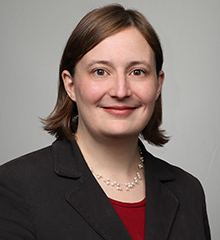McCulloch, ’93, Finds Niche at Phi Beta Kappa
Related Posts
Connect With Us
January 29, 2016

“Phi Beta Kappa is as old as the nation, but we don’t want it to fade into history,” says Ann McCulloch, PBK’s director of chapter and association relations. “It is as relevant today as it was 239 years ago.”
By Chuck Carlson
Sometimes, as Ann McCulloch has discovered, a new start can be found in the place you least expect.
“I spent about 20 years working for associations, mostly transportation related, lobbying Congress,” she said. “There came a point where I thought this is all well and good, but I want something that means more to me personally.”
And she found it in one of the places she knew best and loved most.
For the past year, she’s been the director of chapter and association relations for Phi Beta Kappa, the oldest collegiate honors program in the country and an organization near and dear to her heart.
After all, Phi Beta Kappa and Albion College have a unique and close relationship. Originally founded in 1776 at the College of William and Mary, the organization in 1940 made Albion just the second chapter established in Michigan (next to the University of Michigan) and the first for a liberal arts school in the state.
To date, there are 283 chapters around the country, with three more coming this spring at the University of Houston, Mercer University in Georgia and Oregon State University.
Among Phi Beta Kappa’s 500,000 members are 17 U.S. presidents, 38 Supreme Court Justices, more than 130 Nobel Prize winners as well as Amazon founder Jeff Bezos, Denver Broncos quarterback Peyton Manning, satirist Mark Twain and actress Kerry Washington.
Oh, and Ann McCulloch, ’93, a Chesaning, Mich., native who majored in political science at Albion.
“I loved political science and English courses,” she said. “While I didn’t enjoy science classes much, I knew how important they were. I love learning and I still do. I love thinking about things in a critical manner.”
And she learned much of that at Albion.
“I also appreciated spirited discussion and Albion really promoted that,” said McCulloch, a graduate of the Gerald R. Ford Institute for Leaderrship in Public Policy and Service.
Most Phi Beta Kappa members are elected by the chapters from candidates for degrees in liberal arts and sciences and usually consist of the top 10 percent of the graduating class. A diverse background of learning, though, is prized almost as highly as grade point average.
“Phi Beta Kappa really is special because of its history and ideals,” she said. “That’s the one you strive to get into. When I think about it, one of the things that makes me most proud is being accepted into Phi Beta Kappa.”
To date, more than 1,300 Albion students have accepted invitations into PBK with seven more having been offered early membership this year. They include Zachary R. Barry, Sarah L. McDaniel, Brandon N. Moretti, Emma D. Stapley, Safiya N. Syed, Timothy A. Szocinski and Mary C. Vecellio. Those who accept will be recognized with a ceremony on April 20.
“It’s about taking rigorous classes, thinking deeply,” McCulloch said. “They’re excelling, and these are the types of students who will go on to become crucial thinkers in all different types of fields. We take the love of learning very seriously.”
And it’s McCulloch’s job to travel around the country and extol the virtues of Phi Beta Kappa.
According to a 1996 story in The New York Times, many students, especially at larger universities, were declining the invitation to join, citing the fee ($50 then, $65 now) and a lack of familiarity with the honor society or its relevance.
That’s where McCulloch comes in.
“Students need to be aware of what Phi Beta Kappa can do,” she said. “It’s a mark of distinction, it can open doors and can connect you with people who have the same intellectual spark. Overall, Phi Beta Kappa is trying to relate better to students and be more relevant. But it really does signify a love of learning. It’s something you take forward the rest of your life. Longevity can be a blessing and a curse. Phi Beta Kappa is as old as the nation, but we don’t want it to fade into history. It is as relevant today as it was 239 years ago.”
More recently, the number of students accepting remains high and the number of campus chapters continues to grow.
And it is McCulloch’s intent to make sure PBK remains on the forefront of students’ minds.
“It’s a unique organization,” said McCulloch, who works out of the PBK national office in Washington, D.C. “It’s quite unlike any other honors society in the country. We honor the best and brightest students seeking a liberal arts degree, and we want students to understand their involvement in Phi Beta Kappa doesn’t end when you graduate from your institution.”
As for her change in direction?
“I’m so fortunate to have this job,” she said.